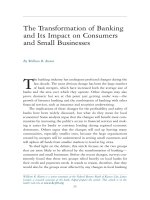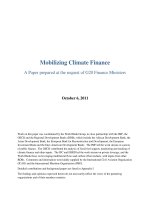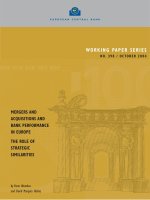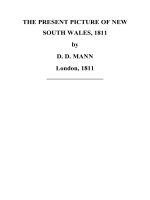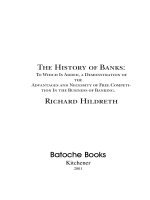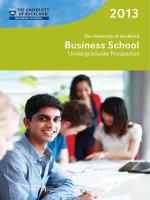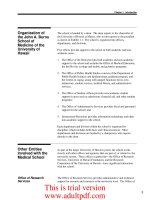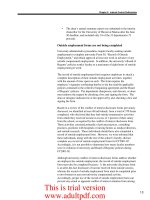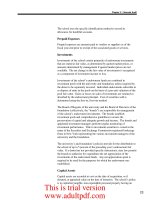THE UNIVERSITY OF NEW SOUTH WALES SCHOOL OF BANKING & FINANCE potx
Bạn đang xem bản rút gọn của tài liệu. Xem và tải ngay bản đầy đủ của tài liệu tại đây (39.34 KB, 6 trang )
THE UNIVERSITY OF NEW SOUTH WALES
SCHOOL OF BANKING & FINANCE
MFIN 6204 INTEREST RATE RISK MANAGEMENT
Course Outline for Session 2, 2005
LECTURER
Office Telephone E-mail
Dr. David Colwell
QUAD 3065
9385-5851
CONSULTATION HOURS: Wednesdays, 4.00 pm – 6.00 pm, or by prior arrangement.
LECTURES
Section A Mon., 6.00 pm - 9.00 pm 190-200 George Street
OBJECTIVE
This subject looks at interest rate risk and techniques for managing risk. Topics covered include
term structure dynamics (including bond price lattices, spot and forward rate models), analytical
and numerical techniques, duration measures, interest rate derivative securities (including options,
futures and swaps), and the interaction between interest rate risk and credit risk. This course is both
theoretical and practical; the emphasis will be on problem-solving.
ASSESSMENT
Assessment is based on an assignment (15 marks), a mid-session examination (40 marks) to be held
on Thursday 8 September, 5:50 pm - 8 pm in class (week 7), and a final examination (45 marks).
The assignment will be spreadsheet based. To help you prepare for exams, we will provide practice
problems—with solutions—each week.
You must achieve at least 42.5 marks out of the 85 marks allocated to the two examinations in
order to pass this subject. If you fail to obtain this cut-off mark, you have not satisfactorily
completed an essential component and you will be awarded an unsatisfactory fail.
The assignment involves working with seven spreadsheets that will be provided to you. There will
be one assignment, due the last week of class. You will have approximately 3 weeks to do the
assignment. You may work in groups of (no more than) 4.
REQUIRED TEXT AND READINGS
Lecture notes (see hand-outs).
2
REFERENCE BOOKS
Sundaresan, S. (2002), Fixed Income Markets and Their Derivatives, 2
nd
Edition, Southwestern.
NOTE: the lecture notes are primarily based on Sundaresan’s book, but I do not require that
you buy the textbook.
Hull, J.C. (2003), Options, Futures, and Other Derivatives, 5
th
Edition, Prentice Hall.
Brigo, D. and Mercurio, F.(2001), Interest rate models: theory and practice, Springer Finance.
STUDENT RESPONSIBILITIES AND CONDUCT
Workload
It is expected that you will spend at least ten hours per week studying this course. This time should
be made up of reading, research, working on exercises and problems, and attending classes. In
periods where you need to complete assignments or prepare for examinations, the workload may be
greater.
Over-commitment has been a cause of failure for many students. You should take the required
workload into account when planning how to balance study with employment and other activities.
Attendance
Your regular and punctual attendance at lectures and seminars is expected in this course. University
regulations indicate that if students attend less than eighty per cent of scheduled classes they may be
refused final assessment.
General Conduct and Behaviour
You are expected to conduct yourself with consideration and respect for the needs of your fellow
students and teaching staff. Conduct which unduly disrupts or interferes with a class, such as
ringing or talking on mobile phones, is not acceptable and students may be asked to leave the class.
More information on student conduct is available at: www.my.unsw.edu.au
Keeping informed
You should take note of all announcements made in lectures, tutorials or on the course web site.
From time to time, the University will send important announcements to your university e-mail
address without providing you with a paper copy. You will be deemed to have received this
information.
SPECIAL CONSIDERATION
Attention is drawn to the following extract from the University of New South Wales Calendar
“Procedures”:
“Students who believe that their performance in a subject, either during session or in an
examination, has been adversely affected by sickness or any other reason should inform the
Registrar and apply for special consideration in the determination of their standing. The
application must be made on the ‘Application for Special Consideration’ form available from
the Student Centre. This application explains the specific information the University requires in
order to make a decision.
Such requests should be lodged as soon as practicable after the occurrence and in any event no
more than seven days after the final examination in a subject.”
3
A photocopy of all material supporting an application for special consideration, as lodged
with the Registrar, must also be provided to the Lecturer-in-charge within three days of any
event for which special consideration is sought. Students who fail to do so automatically give
up their rights for special consideration.
For special consideration on medical ground, students must inform their doctors to post a
copy of the results of any laboratory tests conducted to the lecturer-in-charge directly within
seven days of their availability. Students must also inform their doctors that the lecturer-in-
charge and/or the Examination Assessment Committee may approach them to discuss and
learn about the medical condition in details.
Students should be aware that ‘minor’ ailments are not eligible grounds for special consideration.
Any unsubstantiated request for special consideration will be considered to be ‘minor’.
Students are expected to complete their work in a timely manner so that an illness in the last few
days will not jeopardise the submission of their assignment. Such illness will not constitute
grounds for special consideration.
NOTE: if you apply for a special consideration for the mid-session, the decision as to whether or not
to approve your special consideration will not be made until after the final exam, when a
committee will meet to consider all submissions.
SUPPLEMENTARY EXAMINATION
Students who apply for special consideration are advised that
• the lodging of applications for special consideration does not guarantee that
supplementary assessment will be granted and/or a pass in the subject,
• supplementary examination, if held, will take place during the two weeks prior to the
commencement of session 2,
• it is your responsibility to be available for supplementary assessment during the specified period
(holiday plans are not sufficient reason for non-availability),
• it is your responsibility to inform the University Student Centre of any changes to your
addresses and telephone numbers,
• it is your responsibility to check the details of supplementary examination, if any, including
the time, venue, and list of students who are granted supplementary assessment. The details
will be posted at the School of Banking and Finance’s notice board as soon as they are
available.
ACADEMIC HONESTY AND PLAGIARISM
The University regards plagiarism as a form of academic misconduct, and has very strict rules
regarding plagiarism. For full information regarding policies, penalties and information to help you
avoid plagiarism see:
Plagiarism is the presentation of the thoughts or work of another as one’s own.* Examples include:
• direct duplication of the thoughts or work of another, including by copying work, or knowingly
permitting it to be copied. This includes copying material, ideas or concepts from a book,
article, report or other written document (whether published or unpublished), composition,
artwork, design, drawing, circuitry, computer program or software, web site, Internet, other
electronic resource, or another person’s assignment without appropriate acknowledgement;
4
• paraphrasing another person’s work with very minor changes keeping the meaning, form and/or
progression of ideas of the original;
• piecing together sections of the work of others into a new whole;
• presenting an assessment item as independent work when it has been produced in whole or part
in collusion with other people, for example, another student or a tutor; and,
• claiming credit for a proportion a work contributed to a group assessment item that is greater
than that actually contributed.†
Submitting an assessment item that has already been submitted for academic credit elsewhere may
also be considered plagiarism.
The inclusion of the thoughts or work of another with attribution appropriate to the academic
discipline does not amount to plagiarism.
Students are reminded of their Rights and Responsibilities in respect of plagiarism, as set out in the
University Undergraduate and Postgraduate Handbooks, and are encouraged to seek advice from
academic staff whenever necessary to ensure they avoid plagiarism in all its forms.
The Learning Centre website is the central University online resource for staff and student
information on plagiarism and academic honesty. It can be located at:
www.lc.unsw.edu.au/plagiarism
The Learning Centre also provides substantial educational written materials, workshops, and
tutorials to aid students, for example, in:
• correct referencing practices;
• paraphrasing, summarising, essay writing, and time management;
• appropriate use of, and attribution for, a range of materials including text, images, formulae and
concepts.
Individual assistance is available on request from The Learning Centre.
Students are also reminded that careful time management is an important part of study and one of
the identified causes of plagiarism is poor time management. Students should allow sufficient time
for research, drafting, and the proper referencing of sources in preparing all assessment items.
* Based on that proposed to the University of Newcastle by the St James Ethics Centre. Used with kind permission from the University of Newcastle
† Adapted with kind permission from the University of Melbourne.
OTHER RESOURCES, SUPPORT AND INFORMATION
The University and the Faculty provide a wide range of support services for students, including:
• Learning and study support
o FCE Education Development Unit ( )
o UNSW Learning Centre ( )
o EdTec – WebCT information ( )
• Counselling support -
• Library training and support services -
5
• Disability Support Services – Those students who have a disability that requires some
adjustment in their teaching or learning environment are encouraged to discuss their study
needs with the Course Coordinator or the Equity Officer
( Early notification is essential to enable any
necessary adjustments to be made.
In addition, it is important that all students are familiar with University policies and procedures in
relation to such issues as:
• Examination procedures and advice concerning illness or misadventure
/>ml
• Occupational Health and Safety policies and student responsibilities;
/>ccountability.pdf
.
LECTURE PROGRAM
The following lecture program is a guide to inform you of the main topics to be discussed and the
references from which the lectures are based. This lecture program, together with all the
handouts distributed and unlisted topics discussed in class, constitute the examination
syllabus. This syllabus is subject to change with notice. Practice problems will be given out
weekly, with solutions given the following week.
In the following table, unless otherwise specified, the readings refer to the text by Sundaresan (2
nd
Ed.) The Hull references refer to the 5
th
Ed.
Lect. Date Topic Reading
1 28 July
An Overview of Fixed-Income Securities
Organization and Conduct of Debt Markets
Ch. 1 & 2
2 4 Aug.
Bond Mathematics
Ch. 4
3 11 Aug.
Yield-Curve and Term-Structure Analysis
Ch. 5 & 6
4
18 Aug.
Treasury Futures Contracts
Swaps
Ch. 15
(Hull Ch. 5)
Ch. 16
(Hull Ch. 6)
25 Aug.
No-Arbitrage Principle and the Term Structure (Part I)
Ch. 14
5 1 Sept.
No-Arbitrage Principle and the Term Structure (Part II)
Ch. 17
6
6 8 Sept.
NO LECTURE THIS WEEK
MID SESSION EXAMINATION:
Date: Thursday, 8 September
Time: 5:50 pm - 8 pm
Venue: 190-200 George Street
Syllabus: materials covered in weeks 1 - 6
You are allowed to bring with you scientific or financial
calculators, writing and drawing instruments. NO
PROGRAMMABLE CALCULATORS WILL BE ALLOWED.
Before entering the examination room, for the sake of courtesy
to your fellow classmates, remember to switch off your mobile
phones and the beeping function of your digital watches.
8 15 Sept.
Options Markets (Part I)
Ch. 14
9 22 Sept.
Options Markets (Part II)
(Hull Ch. 22)
29 Sept.
Mid-Session Break—No Lecture.
10 6 Oct.
Options Markets (Part III)
(Hull Ch. 23)
11 13 Oct.
Securitization and Mortgage-Backed Securities
Ch. 9
12 20 Oct.
Agency and Corporate Debt Securities
Ch. 8
13 27 Oct.
Portfolio Management Techniques
Risk Management
Ch. 12
Ch. 19
14 3 Nov. Announcement of additional consultation hours for week 14 and
study break. Review session.
